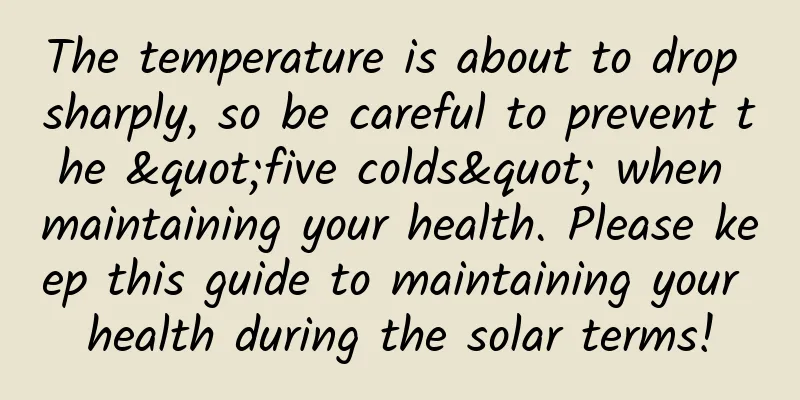Will ovulation occur if there are follicles? An authoritative doctor is here to answer!

|
As we all know, female friends have menstruation every month. Similarly, there is an ovulation period every month. Normal ovulation is very important for every woman, but many conditions are required to ovulate qualified follicles. It is not that the ovulation can be successfully carried out if there are follicles in the body. Only mature follicles can be successfully discharged. 1. How big is the follicle when ovulation occurs How big the follicle must be before ovulation occurs depends on the specific situation. The size of each person's follicle is different before ovulation occurs. If you want to know the exact time of ovulation, you can monitor an ovulation cycle through B-ultrasound. Generally, when the follicle grows to more than 20mm, it is mature and can be discharged in one to two days. Only eggs released from mature follicles can give birth to smart children, which is a necessary condition for eugenics. 2. There are follicles but no ovulation Generally speaking, a woman releases an egg during each menstrual cycle. The successful release of an egg is a very complex process, which gradually develops from the primordial follicle to the dominant follicle, and finally becomes a mature follicle and is released from the ovary. So, what happens if there are follicles but no ovulation? The ovaries have follicles but do not ovulate, which may be caused by the following reasons. 1. Central endocrine disorders. Ovulation is a complex process involving the coordinated action of multiple hormones. When the central endocrine system is disordered, the peak secretion level of luteinizing hormone (LH) is insufficient to stimulate the biochemical and histological changes that lead to the digestion and rupture of the follicle wall, thereby affecting the growth and development of the follicle and the occurrence of ovulation. 2. Local obstacles. Endometriosis, pelvic inflammatory disease, etc. can cause follicles to not ovulate. Take pelvic inflammatory disease as an example. When the fallopian tubes become inflamed, they will thicken, become fibrotic and become cord-like, and may even adhere to the ovaries, uterus and surrounding organs and tissues, forming a hard and fixed mass. In severe cases, it will hinder ovulation from the ovaries. 3. Enzyme deficiency or prostaglandin deficiency. The enlarged follicles are close to the ovarian cortex, and fibrinolysozyme, activated collagenase, and prostaglandins act on the basement membrane of the follicle wall, digesting the follicle wall and causing the formation of the ovarian ovulation pore. If there is a lack of enzymes or prostaglandins at this time, it will greatly affect the discharge of eggs. 4. Hyperprolactinemia. Prolactin affects the normal secretion of gonadotropin from the pituitary gland, thereby causing ovarian dysfunction and affecting the normal development of follicles and the ovulation function of the ovaries. Increased blood prolactin levels reduce the secretion of blood follicle-stimulating hormone, leading to impaired or incomplete development of ovarian follicles, and ultimately leading to anovulation or infertility. 3. The dominant follicle does not ovulate Why does the dominant follicle not ovulate? The so-called dominant follicle in medicine refers to a follicle with a diameter greater than 10mm and less than 18mm as seen on ultrasound. Under the action of estrogen, one follicle will develop into the dominant follicle every month, but if the process is affected by central nervous system diseases, systemic diseases, ovarian diseases, etc., even the dominant follicle will not be able to ovulate. 1. Central diseases: Dysfunction of the hypothalamus-pituitary-ovarian axis can cause symptoms such as menstrual disorders, anovulation, and amenorrhea in women. Pituitary tumors can cause ovarian dysfunction and lead to infertility. 2. Endocrine diseases: Endocrine metabolic diseases such as hyperthyroidism or hypothyroidism, hyperadrenal cortex function or hypofunction, severe diabetes, etc. can induce ovarian infertility. 3. Ovarian diseases: Congenital ovarian dysgenesis, polycystic ovary syndrome, premature ovarian failure, functional ovarian tumors, etc. can all affect normal ovulation. 4. Malnutrition: Severe malnutrition, excessive obesity or lack of certain vitamins in the diet can lead to endocrine disorders, thereby affecting ovarian function and resulting in dominant follicles but no ovulation. |
<<: Can I drink ginger and brown sugar water during menstruation?
>>: What causes bleeding outside of menstrual periods?
Recommend
Recurrent fungal vaginitis
Vaginitis in women is generally caused by bacteri...
Can I sweat after a caesarean section?
Many people think that pregnant women have heavy ...
Calcification in the breast
In fact, prostate calcification is a disease that...
Symptoms of cervical polyps during pregnancy
When pregnant women find that they have cervical ...
[Medical Q&A] If a patient with hypertension has low blood pressure in the summer, can he stop taking medication on his own?
Planner: Chinese Medical Association Reviewer: Xi...
A woman dreams of being a third party
A third party is someone who interferes with the ...
Hepatic encephalopathy is not scary! Uncover the causes and find ways to deal with it
Author: Wang Xiangxiang, The Fifth Medical Center...
What causes pain when women urinate?
Some women often experience lower body pain when ...
How to treat hypoechoic breast nodules?
Breast nodules are a disease that can easily occu...
Will the amount of vaginal discharge increase before ovulation?
Leucorrhea is a normal physiological phenomenon t...
Symptoms of dopamine deficiency in women
The amount of dopamine affects our mood changes. ...
How to check fetal hearing during pregnancy
The development of the fetus is an issue that man...
What are female anal diseases
There are many anal diseases in women, and everyo...
What are the advantages and disadvantages of having an IUD
Female friends can learn more about the pros and ...
What to do if a pregnant woman's belly becomes hard
Some women in the late stages of pregnancy experi...









